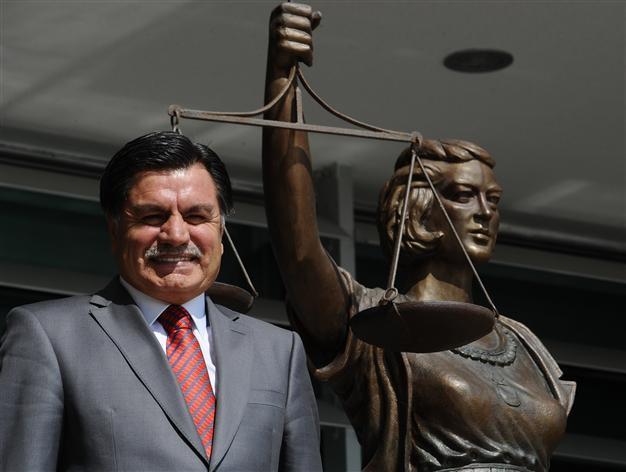Turkish Supreme Court of Appeals’ Balyoz verdict unlikely to change: Top judge
ANKARA - Hürriyet

Turkish Constitutional Court head Haşim Kılıç said that the Supreme Court of Appeals’ verdict on the 'Balyoz coup case is unlikely to change. DAILY NEWS photo, Selahattin SÖNMEZ
The Supreme Court of Appeals’ verdict on the “Balyoz” (Sledgehammer) coup case is unlikely to change, Turkish Constitutional Court head Haşim Kılıç said as an answer to criticism of the final rulings leading to suggestions that the judgments could be different in further appeals.
“I know the [judges] at the Supreme Court of Appeals from years. They have been serving ably for a long time. It is a meticulous and experienced team that has a command of the situation. That’s why the possibility of their making mistakes is very slim,” Kılıç was quoted as saying by daily Hürriyet on Oct. 11.
The Supreme Court of Appeals approved the convictions of 237 suspects in its much-anticipated verdict in the Balyoz case on Oct. 9, while quashing the convictions of 63 other suspects on the grounds that they had agreed to commit a crime but had not followed through and actually committed an infraction.
The verdict was the product of the longest trial in the history of the Supreme Court of Appeals, with the process including defenses from 96 lawyers at 17 sessions that stretched out for a month.
Many observers suggested that the legal process has not ended, stressing that individual applications could be submitted to the Constitutional Court and the European Court of Human Rights (ECHR) could be seized as a last judicial instance.
Constitutional Court no ‘super savior’Kılıç also said the perception that both Turkey’s Constitutional Court and the ECHR were “super appeal courts” was false as the top court does not have the legal power to reexamine the case.
“Following the Supreme Court of Appeals’ Balyoz verdict, there was an attempt to create a [perception] that either us [the Constitutional Court] or the ECHR are ‘super saviors with super appeal [powers or authority].’ First of all, the Constitutional Court does not have the authority of lodging an appeal against trials that have already been assessed and appealed,” Kılıç said, stressing that a concrete provision existed on that matter.
“If an application is submitted, we can only look at if the trial conforms with relative legislation, if the suspects’ defense has been sustained according to law, if there have been freedom violations during the trial process and long-term detentions. Beyond those, we can’t intervene with the sentences,” Kılıç said.
“Similarly the ECHR has the same task and authorities of the Constitutional Court. It only considers if there is a violation of the freedoms and rights cited in the European Convention of Human Rights. Neither the ECHR, nor us can look to the attributes of the crime, the evidences or the degree of the sentences,” he added.
Kılıç also commented the government’s democratization package announced on Sept. 30, saying that every step towards democracy was important.
“If there is even a centimeter of a step that will relieve Turkey in terms of democracy, we don’t feel concern but happiness. This country can’t attain anywhere with paranoias,” Kılıç said, adding that he believed more steps should be made in the future.
The package made public by Prime Minister Recep Tayyip Erdoğan was criticized for its shortcomings while the removal of the headscarf ban for female public servants and the removal of the student oath had caused unease in the ranks of the opposition.
